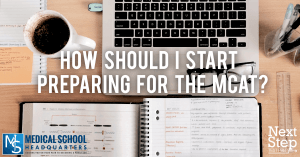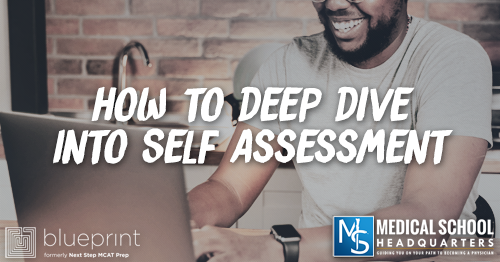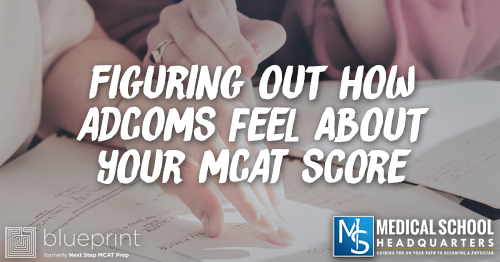Apple Podcasts | Google Podcasts

Session 2
In today’s episode, Ryan and Bryan talk about what you need to do as an undergrad or a nontraditional student when you first find out about the MCAT. They tackle the first steps and what you should do to start preparing for it.
Here are the highlights of the conversation between Ryan and Bryan:
Your first steps:
- Familiarize yourself with the basics.
- Go to the AAMC.
- Hop on Amazon and buy a book called the AAMC Official Guide.
- Read the entire book from cover to cover then you will know exactly what to expect on this exam.
What you get from the AAMC Official Guide:
- The entire playbook for the MCAT
- How it was put together
- A full science outline about the sciences you need to know
- 20 practice passages
MCAT versus SAT:
- Both are standardized and required.
- MCAT is an actual, real, got-to-know-it content style exam
- MCAT is a test to see how well you take the MCAT
- Your MCAT score has a predictive correlation to your grades but only the first year of medical school.
- MCAT is its own beast.
The best timeline to get the AAMC Official Guide:
Right now. There is no time too early. Realistically, do it sometime in your junior year or anywhere from 4 months to 4 years before taking the MCAT. It’s never too early to start learning the basics.
Links and Other Resources:
Blueprint MCAT (formerly Next Step Test Prep)
AAMC Official Guide
Transcript
Introduction
Dr. Ryan Gray: The MCAT Podcast, session number 2.
A collaboration between the Medical School Headquarters and Blueprint MCAT (formerly Next Step Test Prep), The MCAT Podcast is here to make sure you have the information you need to succeed on your MCAT test day. We all know that the MCAT is one of the biggest hurdles, and this podcast will give you the motivation and information that you need to know to help you get the score you deserve so you can one day call yourself a physician.
Now if this is the first time joining us here at The MCAT Podcast go back and listen to session number one and find out who we are. I’m Dr. Ryan Gray from the Medical School Headquarters. I also host The Premed Years and the Old Premeds Podcast, so if you don’t subscribe to those I highly recommend you do. You can find those- you can find everything we do actually at www.MedEdMedia.com. That’s www.MedEdMedia.com.
Every week I will have somebody from Blueprint MCAT (formerly Next Step Test Prep) here with me and this week we have Bryan back. He is kind of the head man over at Blueprint MCAT (formerly Next Step Test Prep) for the MCAT, and we’re going to talk a lot about what to do when you first really find out about the MCAT as an undergrad student or even as a nontraditional student. Those first steps that you should take when you realize that the MCAT is a thing, and what you should do to start preparing for it. So let’s go ahead and get into it.
Bryan, thanks again for joining me here at The MCAT Podcast.
Bryan Schnedeker: Glad to be here, Ryan.
Dr. Ryan Gray: Alright so last week we talked all about kind of who we are, and who Next Step is, and the course that you guys are coming out with- the MCAT Class as you guys are calling it, which is awesome. But let’s go ahead and rewind for the premed student listening to this who maybe has just signed up for the MCAT, or maybe they just realized that they need to take the MCAT. I don’t know about you, but I think I was very- and I’ve talked about my premed path before, but I was very naive on the premed path because my advising wasn’t so great. And so I think I didn’t know about the MCAT until the last minute. So let’s talk about a student and a premed student who knows they have to take the MCAT, and what they have to do from that point.
How Students Should Begin to Prepare for the MCAT
Bryan Schnedeker: Yeah sure, absolutely. And Ryan I had a very similar experience actually coming from the opposite end. My pre-health advisor was amazing and because they sort of did everything for us it left a lot of us kind of not taking a whole lot of initiative on our own. So I got dumped into the MCAT a little prematurely perhaps, and hopefully we can avoid that experience for our listeners here. So first things first, as soon as you realize you have to take this big, scary, super ultra SAT for med school, right the big test for med school, you need to start by just familiarizing yourself with the basics. And so the first place I’m going to send you, which is the first place that any reputable advisor would say; it’s not to some prep company, not even to Next Step although I know how great we are, it’s to the folks that make the test itself. The AAMC, they make the MCAT, they are going to jock you through the med school application process, right on through to residency, I mean they are the Grand Poohbah here. So step number one is actually real simple, just hop on Amazon and buy a book called, ‘The AAMC Official Guide.’ It shouldn’t be any more than maybe $25 for this thing. Make sure you’re actually buying the right thing, the name is just ‘Official Guide,’ but when you do a search you can get all sorts of weird random things on Amazon because it just likes to firehose different products at you.
Dr. Ryan Gray: Yeah and I’ll put a link to it in the show notes for this page so it will take students directly to where they need to go.
Bryan Schnedeker: There you go, perfect. So you spend the $25 or whatever for the AAMC Official Guide, and what you’re going to get in that book is essentially the entire playbook for the MCAT; how it was put together, a full science outline on what the science is that you need to know. You’re going to get twenty practice passages, which is equivalent of about half an MCAT. So you’re going to get about a half a test’s worth of practice passages. And you know, look reading the ‘Official Guide,’ it’s like reading the phone book. For those of your listeners who are young enough to have never seen a phone book before, it’s a big thick boring book with phone numbers in the pre-Internet days. So the thing is it is dull as dirt but it is absolutely necessary. You just have to slog your way through this ‘Official Guide,’ read the entire thing cover to cover. And I guarantee you when you’re done doing that, you will know as much about the MCAT as almost anyone out there. And I would even suggest you will know- if you’ve actually read the entire ‘Official Guide’ cover to cover you’ll know more about the MCAT than honestly even a lot of premed advisors because they don’t do it, they don’t read the whole book. And at the end of that you’ll be a very sophisticated premed who knows exactly what to expect on this exam. So that’s always the first step.
Dr. Ryan Gray: That’s awesome. I want to go back, you used the words ‘SAT for med school.’ I wish the MCAT was like the SAT. Can you as briefly as you can talk about why the MCAT is in my mind nowhere near anything like what the SAT is.
Bryan Schnedeker: Okay, yeah that was definitely a fast and loose analogy. The analogy simply being that you have to take the SAT or ACT to go to college, you have to take the MCAT to go to med school, that’s literally where the similarity ends. The MCAT is a standardized test on steroids. So it has biology, chemistry, organic chem, physics, psychology, sociology, biochemistry. It is an eight hour day. It is a killer. So it’s only like the SAT in that they’re both standardized and they’re both required, but other than that the MCAT is an actual real got-to-know-it content style exam.
Dr. Ryan Gray: Yeah I think that would have confused a lot of people going, ‘Oh I rocked my SATs, that’s going to be easy. The MCAT’s going to be easy.’ But it’s not. I call the MCAT test the test to see how well you take the MCAT, that’s all it is.
Bryan Schnedeker: Yeah absolutely. And of course the AAMC has all sorts of data and statistics to prove the reliability and validity and all that statistical stuff. And there is some truth to it, that your MCAT score does have a kind of predictive correlation to your grades, but only the first year med school. It doesn’t tell you how good a doctor you’re going to be, it doesn’t tell you what kind of residency you’re going to get. It assesses literally nothing except for exactly what you said. How well did you do on the MCAT? And then has this kind of very tangential weak correlation with grades first year of med school. But it is its own beast, it is its own weird little thing which is why there’s a whole industry like Next Step to prep kids for it.
Dr. Ryan Gray: Yeah. What is the best timeline for somebody to go out and get this AAMC Official Guide? Is this something a freshman should do? A sophomore? A high school student?
Bryan Schnedeker: I would suggest while they’re still listening to this podcast.
Dr. Ryan Gray: Right now.
Bryan Schnedeker: Keep listening to us talking and buy it on Amazon right now. There’s literally no time that’s too early.
Dr. Ryan Gray: Okay.
Bryan Schnedeker: Having said that, realistically assuming you’re kind of following the normal timeline where you’re planning to take the MCAT while still in college, sometime in your junior year. Anywhere from four months to four years before you take the MCAT, it’s never too early to just start learning the basics.
Final Thoughts
Dr. Ryan Gray: Alright well there you have it. That’s what you should be doing as you first find out about the MCAT. Don’t wait until your junior year like I did when I realized that there was this big test that I needed to take, and scramble at the last minute to start preparing for it. So lots of good information there on what you should be doing, those first steps that you should be taking as an undergrad student, as a nontraditional student; as soon as you realize that there’s this big test called the MCAT, it’s what you should be doing. So I hope you got a lot of great information. I hope you come and join us every week here at The MCAT Podcast. The easiest way to do that is to subscribe to The MCAT Podcast in your podcast player of choice on iOS devices, there is the podcast app which is the default Apple app. On Android devices you can listen in Google Play Music, or any other app that you can use to listen to podcasts. So subscribe, it’s free and every week you’ll get the podcast right on your device.
Alright I hope you have a great week and I look forward to talking to you next week here at The MCAT Podcast.
SEARCH SITE
SEARCH SITE
LISTEN FOR FREE











